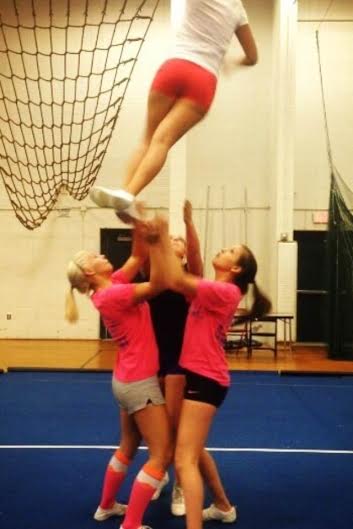Teachers and coaches at Ludlow High School have recently noticed a significant increase in concussions being diagnosed among student-athletes within the past three to four years.
“As of 2011 all schools in Massachusetts must have a concussion policy,” say Nurse Stephenie Chmura. “Everyone is now better trained in diagnosing them. Students are educated, athletic trainers have the ability to identify a concussion, and parents are required to sign a permission slip with information involving a concussion before their child can participate in any sport.”
So far this year there have been a total of 14 concussions diagnosed as a result of playing the following sports: cheerleading, football, volleyball, dance and soccer.
“I fell out of a stunt and I ended up hitting my head on the mat,” says cheerleading freshman Emily Sajdak, who still isn’t cleared yet to play sports. “It is one of the worst feelings in the world knowing that you are pretty much useless.”
Sajdak reports difficulty concentrating in class and not being able to understand what the teacher is teaching. She was not allowed to watch TV, talk on the phone, or be around too many people.
“I couldn’t do anything,” she said. “Sometimes I would sleep for 14 hours straight.”
Basically, Sajdak wasn’t allowed to use her brain for too much of anything.
According to Web MD, ”A concussion is a brain injury that occurs when you receive a sudden blow or jolt to the head. It is a type of traumatic brain injury (TBI). A doctor may call a concussion a “mild brain injury.” Most concussions are not life- threatening, but they can have serious effects.”
Long term headaches, nausea, foggy eyesight, dizziness, poor memory, and slowed responses are all some common symptoms to having a concussion.
“If enough force is hit anywhere on the body, even if your head is never touched, you can still wind up with a concussion from your brain just moving out of place,” says LHS nurse Sonia Jaworski.
The nurses and students have reported that stress is an added component to being diagnosed with a concussion. At some point after they heal, students will be required to make up the work missed. If they go back to doing schoolwork too early, more harm could be done.
“If you are trying to to get all of the work done all at once or in a short amount of time, you can cause your brain to start to go into a work overload and concussion symptoms may occur again,“ says Jaworski. If patients do not allow for full recover, symptoms many never go away or the concussion may even cause death, she added.
“Grades should not be affected by your concussion because teachers are required to reduce the work you can do,” says Jaworski. “You are supposed to be graded on quality not quantity.”
There are many students who start to worry about the work overload and they fear that they will not be able to get everything done.
“Students are not given a limit to how many days they can be out for a concussion,” say Jaworski. “Some students are out for months. It is all based on the individual’s recovery time.”
Sports are the most common way to receive a concussion due to contact with another person or another object.
Within cheerleading, there can be mistakes such as someone forgetting the counts of the routine, the flyer is off balance, or the bases can be off count. Cheerleading, football, and women’s ice hockey are the most dangerous sports in terms of causing concussions.
In football there are many different ways to end up getting hurt. In sophomore Dustin Martins’ case, he made helmet-to-helmet contact with his opponent during a home game against Mahar Regional High School.
“Most people don’t do any work while they have a concussion. I still did everything,” says Martin who called his concussion minor. “After a week-and-a-half I was able to come back and play football.”
While most dancing injuries include broken limbs, sprains, or pulled muscles, concussions are not always avoidable.
“I got it by getting kicked in the head at dance class,” says senior Chloe Forrant, “It sucked because I missed a week of school and my grades were affected by missing so much school.”


